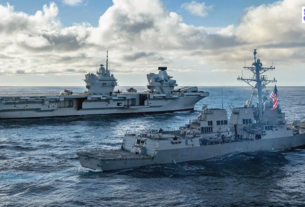The Royal Navy has achieved a major technological milestone after HMS Dragon successfully intercepted a supersonic missile during Exercise Formidable Shield 2025 marking the first time a British warship has neutralized such a high-speed aerial threat.
The Type 45 destroyer, equipped with the advanced Sea Viper missile system, detected and destroyed the incoming target off the coast of Scotland in a simulated live-fire scenario, as part of NATO’s premier integrated air and missile defence exercise.
“This is a landmark moment for UK naval power and a clear demonstration of our ability to counter the most sophisticated threats,” said Admiral Sir Ben Key, First Sea Lord.
Technological Breakthrough
The intercepted missile was designed to mimic a modern, supersonic anti-ship threat the type increasingly deployed by adversaries such as Russia and China. Travelling at more than Mach 2, the missile was successfully tracked and engaged by Sea Viper’s multi-function radar and vertical launch system.
Key technical features of the Sea Viper system include:
- Simultaneous tracking of multiple targets
- Automated threat classification and engagement
- Extended range missile capability
- Integration with NATO and Five Eyes allied platforms
This successful test confirms the Royal Navy’s position at the forefront of maritime air defence in Europe and strengthens interoperability with allied forces.
Strategic Implications
The successful interception comes amid heightened focus on missile defence capabilities across NATO, particularly in the wake of Russia’s use of hypersonic and ballistic missile systems in Ukraine.
“We must be prepared for tomorrow’s battlefield. HMS Dragon’s performance shows that the UK is ready to meet these evolving challenges,” said Defence Secretary John Healey.
A Signal to Adversaries
Exercise Formidable Shield 2025 involves 20 NATO allies, hundreds of personnel, and a wide range of missile defence tests in the Atlantic theatre. The Royal Navy’s role in the exercise signals a strong commitment to protecting allied fleets and critical sea lanes.
Public and Allied Response
Military analysts and NATO partners widely praised the interception as a critical validation of UK air defence readiness. The U.S. Navy’s European Command described the event as “a major step forward in transatlantic missile defence cooperation.”




